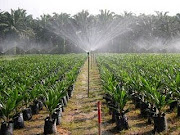Palm oil sector to generate RM4bil jobs
IPOH: The Federation of Malaysian Foundry & Engineering Industries Association (FOMFEIA) expects the palm oil sector this year to generate about RM4bil worth of jobs, compared to about RM3bil in 2009, for its members involved in manufacturing equipment and providing engineering services to the industry.
FOMFEIA president Liew Chee Ming told
StarBiz that over 50% of the jobs were likely to come from overseas as land suitable for oil palm activities in the country was becoming scarce and expensive.
“Business opportunities for our members are in providing new palm oil processing machinery and engineering services to maintain their plant and equipment.
“Indonesia and Papua New Guinea are the two countries where the business opportunities for oil palm would come from this year, as vacant land are still cheap in these countries. “For example, vacant land is sold for RM8,000 to RM9,000 per acre in Malaysia, compared to between RM1,000 and RM2,000 per acre in Indonesia. “Many oil palm players from Malaysia have already gone to these two countries,” he said.
According the MPOB report, the acreage of the oil palm estate in Malaysia grew by 4.5% to 4.7million ha in 2009 from 4.4 million ha in 2008.
“In Indonesia, the acreage of oil palm estate grew to 7.1 million ha in 2009, compared to 6.8 million in 2008, a rise of about 5%. “The Indonesian government allocated recently up to 9 million ha for oil palm cultivation,” he said. About 10% of FOMFEIA’s 3,000 members manufacture equipment and provide engineering services to the palm oil industry. “In Malaysia, the production of crude palm oil is expected to increase by 3.1% to 18.1 million tonnes this year, compared to 17.56 million tonnes in 2009, according to the Malaysia Palm Oil Board recent report.
“Till June this year, Malaysia’s crude palm oil production has already reached 7.9 million tonnes,” he said.
Liew also urged the Government to allocate for infrastructure spending for its forthcoming 2011 budget to stimulate the engineering sector. “In 2004, the Government had allocated about RM10bil for infrastructure works in the country. We hope the Government would allocate a similar amount for infrastructure, as the country’s economy is still in the recovery stage,” he said.
MSHK Engineering Sdn Bhd, a leading oil palm factory turnkey contractor in the country, has invested about RM53mil in expanding its plant in Ipoh and to acquire 6,000 acres of mature oil palm plantations in Sarawak to supply fresh fruit bunches to the domestic market. Executive director C.H. Liew said the company was now eyeing new oil palm equipment markets in Papua New Guinea.
“We are now providing engineering services for several Malaysian oil palm companies operating in Indonesia. We expect our business to grow about 10% this year, despite a challenging economic climate, due to strong overseas demand for our equipment and services. About 50% of our business comes from overseas,” he said.
Meanwhile, Penang Foundry & Engineering Industries Association (PENFEIA) president Datuk Ng Chai Eng said that as there was volatility in the semiconductor equipment market, PENFEIA members involved in precision tooling activities should diversify into providing the sheet metal and machine structure fabrication services for high-tech industrial and medical equipment.
“There are a lot of opportunities in this area from China, where there are multinational corporations keen to outsource machine structure fabrication work to countries like Malaysia that can provide consistent quality work. “In this area of work, we face competition only from Thailand,” he said. Ng said PENFEIA had 200 members, and some 50% of them had already moved into the machine structure fabrication business. “To retain skilled workers, our members have recently raised wages by 15% to 20% for all their technical and engineering staff,” he said.
read more >>
here



